Our Path towards Sustainable Development
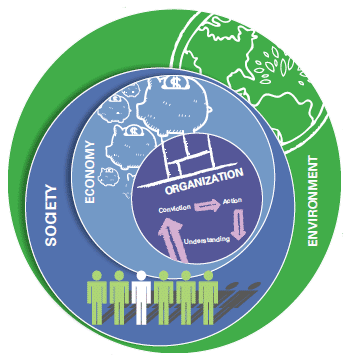
Source: inspired by the model "Knowledge, Conviction and Action" proposed by Russel Colley (1961) and Natural Step.
Extraordinary transformations have been observed in the economic, regulatory, political, social and natural environments. Businesses both contribute towards these transformations and are affected by them. The path chosen by KPMG was to understand these changes and their effects, discover how to manage them in a strategic way, creating conviction and involvement throughout our Organization. We will follow this path based on an ethical and responsible vision and behavior which contribute to the transition to sustainable development and to the generation of collective value.
Within this context, sustainability has become an increasingly important value within our management practices and in our businesses. The engagement we undertook with our stakeholders, reiterated that questions related to ethics, governance, quality and the independence of our services, as well as involvement with our professionals, are the best ways that we can influence and add value, given that all of them are attributes of sustainability: responsible practices contribute to sustainable development.
Our main vocation, within the context of sustainability, is to perform our work with quality and integrity, developing skills and generating knowledge and value through our services, contributing towards best practices in the markets in which we operate.
Internally, we maintain policies, principles and values that are related to human and labor rights, ethics, governance and anti-corruption, responsible management of natural resources and the impacts our activities.Externally, these principles are encouraged by KPMG throughout our chain of values, through the various services that we provide to our clients, in the relationships with our suppliers and with our communities.
Our practices have an important role in economic and social relations. We create value for our clients through the solutions that help them develop competitive advantages in an increasingly complex environment and understand and contribute in an appropriate manner to the national tax system and also provide greater transparency and credibility to their financial statements.
Our practices help the capital market face its challenges, and can make public services more efficient, the financial market more stable, and develop governance in various segments, contributing towards building a vibrant and more sustainable society.

KPMG in Brazil is increasingly more committed and collaborative. Through a more reflective attitude and a more integrated vision, it has been able to observe the connection between sustainability and its businesses and understand how to potentialize positive impacts and minimize any negative impacts arising from its activities.
Within this context, we have identified, for example, that given the segment in which we operate, our direct impact on the environmental is not material, which is the reason why our management of this aspect consists of diagnosing, monitoring and making our professionals more aware, with specific goals established for eco-efficient items.
Nevertheless, strategically, we have the opportunity to exercise an important role through our services in sustainability, and to contribute through better management of the numerous opportunities and challenges in our complex world that is constantly changing. These services are presented in detail in the item Our Practices > Risk Consulting.
Understanding the report
Scope
GRI 2.9 | 3.1 | 3.6 | 3.7 | 3.8 | 3.9 | 3.11 | 3.13
We have published, for the second year running, KPMG in Brazil Sustainability Report, aligned with the third version of the international guidelines from the Global Reporting Initiative (GRI) with the self-declared application level of B+.
This document reports the performance of the group of individual entities that operate under the KPMG name, in Brazil (referred to throughout this report as KPMG or KPMG in Brazil) and their operations at the 25 offices during the year from October 01, 2010 to September 30, 2011 (reported as 2011).
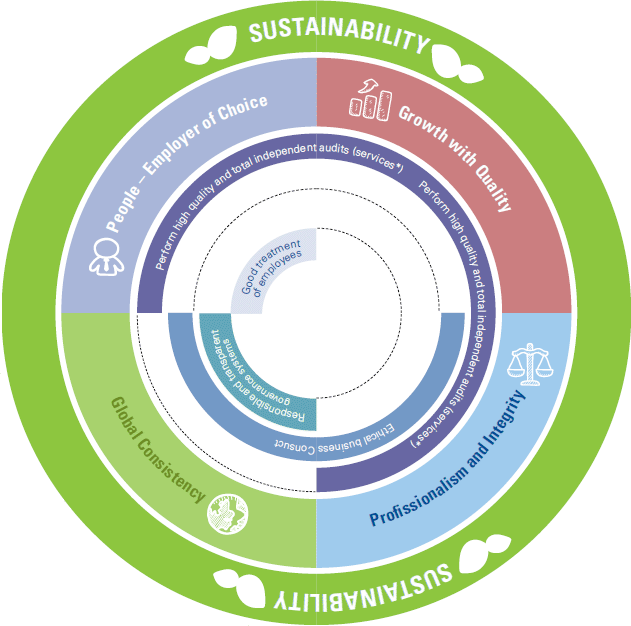
During this period, we acquired the fifth largest audit firm in Brazil and therefore, there was a significant increase in the number of employees, which had an impact on the results for the performance indicators compared to previous years. For a better understanding and to put into context, in certain cases, information is presented for KPMG International, and also the methodologies, the bases used and the specific periods for certain data. GRI 2.9
The information presented in this document was assured by BSD Consulting.
Structure
As in the previous publication, this report is structured based on the global strategy of KPMG International, which is reviewed every five years. The latest strategic review occurred in 2010, and for the cycle 2011-2015, the four fundamental pillars of global strategy, presented in the diagram above, continue to act as a framework. Based on these pillars, goals and strategic objectives were established and prioritized, aimed at integrating and potentializing the actions of the member firms throughout the world.
The strategic objectives to which the KPMG International member firms are worldwide committed include the following:
- Investment in emerging markets
- Focus on key sectors such as financial services, health, government, infrastructure and energy
- Strategic acquisitions and investments to extend our skills in highly complex services, including management and tax consulting
And, in order to succeed with this strategy, we need to ensure that KPMG maintains an important source of professionals that are specialized in these segments.
Frequency and format
GRI 3.2 | 3.3 | 3.4 | 3.9 | 3.10 | 3.11
As from this edition, the KPMG in Brazil Sustainability Report will be published annually. The first report, published in 2011, referred to the two years 2009-2010. As in the previous edition of our report, the accounting data complies with the practices adopted in Brazil. The scope, limit and measurement methods have not altered, therefore, there are no reformulations of the information provided in the previous year.
We rely on your participation to enable us to improve our report every year. Please send us your doubts, comments and suggestions.
Maria Cristina Bonini Director of Learning, Development and Corporate Citizenship
and Eliane Momesso Manager of Corporate Citizenship
comunidade@kpmg.com.br
Tel.: +55 (11) 3736-1228
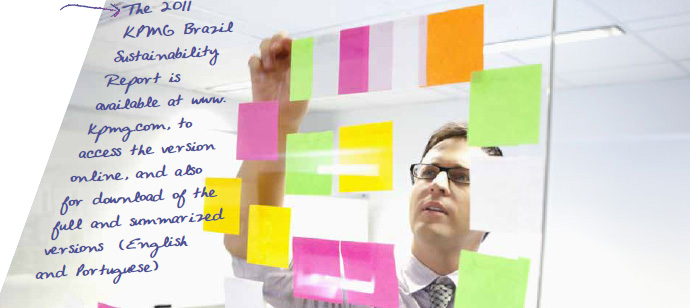
Our strategic stakeholders
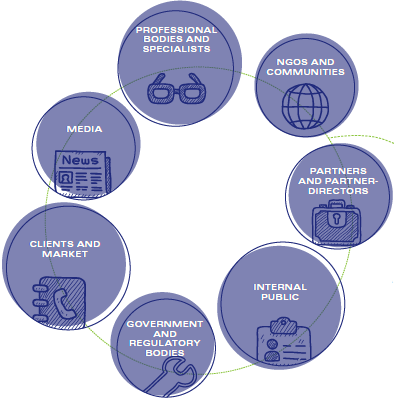 Mapping, engagement and consultation
Mapping, engagement and consultation
In 2009, KPMG in Brazil prepared its first mapping, prioritization and engagement of stakeholders. Representatives from all of the areas and all of the offices were invited to participate in the initiative, which we called Workshop – Sustainability Committee. This Workshop provided the opportunity to align knowledge of sustainability and, during the debates (1st. stage), the participants mapped 14 groups of stakeholders.
During the 2nd stage, the KPMG Executive Committee and Directors from the Corporate Citizenship area prioritized the groups according to the level of influence: those that had the greatest impact on KPMG, and those that are most impacted by our activities. Subsequently, four stakeholder groups were prioritezed for our business: partners and partner-directors; internal public; clients and the market; regulatory bodies and the Government.
During 2011 there were no changes in our activities that required new mapping. However, we participated in the pilot program implemented by KPMG International, in England, called Stakeholder Engagement Research, which included an independent consulting firm acting as facilitator.
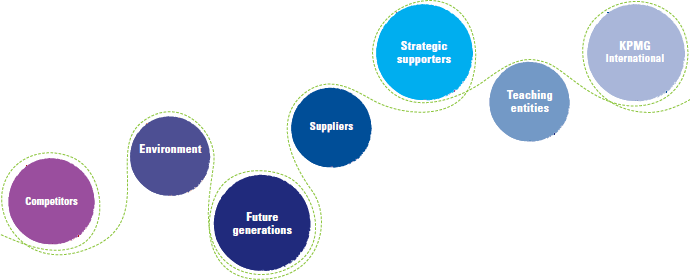
The consulting firm identified three other groups and suggested that they be included in the engagement: Media, NGOs and communities, Professional Bodies and Specialists. The prioritized groups were then consulted (3rd stage), and the main themes that they would like to see published in our report were identified. This process is presented in the next heading.
Our relationship with all of the different stakeholders mapped occurs naturally and in different ways whilst undertaking our business. However, the prioritization of stakeholders that most influence or are influenced by our business is fundamental for an increasingly efficient management.
Definition of material themes
The 2011 definition of material themes was prepared in a different way to the work performed in the previous cycle. We based the work on the pilot program prepared by KPMG International called Stakeholder Engagement Research which involved seven member firms and an independent consultant - Good Business, in England - as the facilitator. Based on the understanding of the context in which our business is inserted and its role in society and the capital market, the consulting firm mapped our main stakeholders, and the main themes of interest.
The engaged member firms, which included KPMG in Brazil, consulted locally the following stakeholders – clients; partners and partner directors; employees; regulatory bodies and sector specialists; society and media – based on individual interviews (personally or by telephone) in order to understand what these stakeholders believed to be the main responsibilities of a professional service company and based on this information, identify the themes that we needed to focus on in a more strategic way.
We begin with the general understanding that our professional services sector offers three main services to clients: Audit, Tax and Advisory. The Audit services involve auditing the financial statements of companies, to determine whether the results have been calculated in accordance with accounting principles in force in the country, in order to provide credibility to the shareholders and other stakeholders. The Tax services involve consulting for taxes due on the activities undertaken by companies and individuals, and on compliance with accessory obligations required by tax regulations.
The Advisory services involve providing assistance to clients so that their business is undertaken efficiently and effectively, within regulatory environments that are constantly changing.
| The nine themes identified by Good Business aim to explore a wide range of impacts from the sector that provides these professional services, depending on the functions and responsibilities of the sector in relation to the business world and the public in general. In addition to these themes, the stakeholders were also encouraged to include themes that they considered relevant to our business, but were not included in the initial list. The results of the consultation did not produce additional themes to those suggested, which were considered sufficient to cover the relevant issues for KPMG. |
|
KPMG in Brazil interviewed 37 representatives from these groups, which included 7 clients, 18 professionals from all practices of the Organization (partners, partner-directors and employees in general), 3 representatives from regulatory bodies, sector specialists and/or regional councils, 5 representatives from society and 4 from the media.
The stakeholders were invited to list these nine themes by order of importance. From our analysis of the assessments received from the internal and external public, four themes were considered of greater relevance and will be examined throughout this report. They will also act to support corporate policies and determine action plans for our Organization.
It is important to highlight that the themes prioritized in 2011 are strongly related to the basis of our global strategy presented in the previous report, which confirms the path chosen by KPMG and justifies adopting the same structure for the report in this new cycle.
- Ethical business conduct
- Responsible and transparent governance systems
- Conduct high quality and independent audits (services*)
- Good treatment of employees
*KPMG in Brazil understands that all of its services have to be provided with high quality and independence, consequently, we extended the scope of this material theme.
Material themes
| Ethical business conduct | 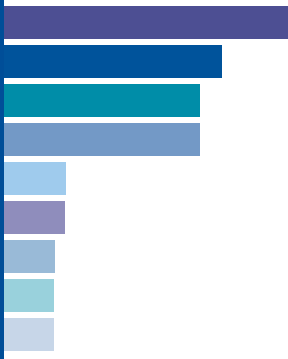 |
|
| Responsible, transparent governance systems | ||
| High quality independent audits | ||
| Good treatment of employess | ||
| Supply chain impacts | ||
| Positive social and community contribuitions | ||
| Environmental impacts | ||
| Environmental and social client services | ||
| Responsible tax advice |
© 2012 KPMG Auditores Independentes, a Brazilian entity and a member firm of the KPMG network of independent member firms affiliated with KPMG International Cooperative (“KPMG International”), a Swiss entity. All rights reserved.
KPMG International Cooperative ("KPMG International") is a Swiss entity. Member firms of the KPMG network of independent firms are affiliated with KPMG International. KPMG International provides no client services. No member firm has any authority to obligate or bind KPMG International or any other member firm vis-à-vis third parties, nor does KPMG International have any such authority to obligate or bind any member firm.